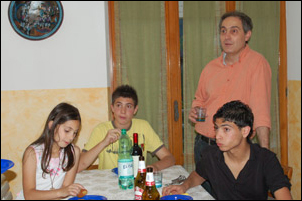Six-kid family a throwback in low-birthrate
Italy
Article by Devon Dolan
In a Roman Catholic country where a big family was not so long ago the
norm, the recent trend in families is fast becoming a household of three.
The decline of large families – a response to more women working,
scarce childcare, and lack of government support – is debated throughout
the country. But what’s it like to live in an old-fashioned, large
Italian family today?
Though they only planned to have four children, Fabio Magnanelli, 46,
and Marina Panico, 40, are the proud parents of six kids – four
boys and two girls. Growing up in a very closely knit family, the children,
who range in age from six to 17, are not spoiled; they are taught from
an early age to help and respect one another. Each shares a room with
a sibling, and all are expected to take on responsibilities in the home.

This family is an anomaly in Italy, which has the lowest birthrate in
Europe – an average of 1.2 children per woman.
Friends and acquaintances are amazed at how Magnanelli and Panico deal
with the demands of a large family. Panico says many think she and her
husband are “crazy,” or peg them – in what Marina views
as a form of narrow-mindedness – as religious fundamentalists.
But she defends her decision. “I am just a normal woman who happened
to have six children.” She is thankful and feels blessed by her
large family.
Magnanelli says one of the reasons for the decline in births is that families
do not need a lot of children to work the farm or run the family business
as they did in the past.
“What once was common is now looked upon as almost heroic,”
he says.
Panico says women have more control over their own lives today and many
feel having more than one child is too demanding. These days, most Italian
women work full-time outside the home.
Magnanelli notes that before World War II, a man was obliged to pay a
special tax for not being married. It is more common for a man to live
as a bachelor now, often with his parents well into his 30s. Also, industrialization
has prompted people to move away from their families to find jobs in the
cities, leaving them with less help with raising children.

Though
their family structure is different from most, Panico says their days
and problems are like those of other families. She still has to cook and
clean, juggle appointments and chauffeur the younger ones among their
various activities. Now that even the youngest is in school, she works
in the linen and uniform department at a hospital for 35 hours a week
to help with their income.
Panico feels the hardest challenge of raising six children is helping
them grow emotionally, especially through adolescence, in a country of
changing values. The children are realizing the importance of style and
want brand-name clothing, but with so many Panico finds it difficult to
give them everything they desire. The family has to make sacrifices, such
as not taking long trips or buying expensive clothing.
Still, both Magnanelli and Panico believe they have given their children
everything they need. Their success is proven by how happy and content
the children are. Panico says her children see the world differently from
children in small families.
Magnanelli says the state, in its words, emphasizes the importance of
family, but that in fact it does little to ease the day-to-day burdens
of getting by with several kids.

Magnanelli,
who works as a manager in a factory making pots and pans, recalls that
when he and Marina were looking to buy a home not long after getting married,
a realtor showed them an apartment with two bedrooms. Magnanelli and Panico
told the man they needed a larger house because they were planning on
having at least four children. The realtor said homes these days are not
made for families with more than one or two children, and suggested they
adapt to the new way of family life in Italy.
Though the Magnanelli home can be chaotic at times and sacrifices have
to be made, most of the children seem to enjoy being part of a large family.
Even so, when asked whether they would like to have a lot of kids when
they form households of their own, four of the five said no. Only the
second oldest, Giovanni, held out the prospect of having three children,
saying he’d like “una via di mezzo,” or between a big
and a small family.
Video by Catherine Leung
Photography by Vanessa Reeves
Web Design by Laura Stagliano |

